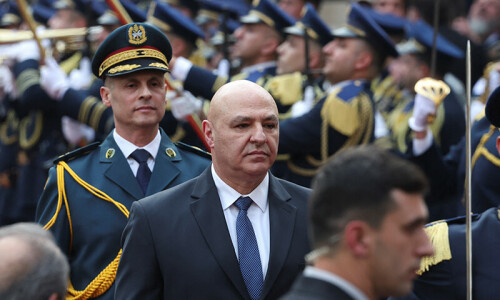
LAHORE: Eminent writers and journalists discussed news and its current status in an interesting session at the Lahore Literary Festival on Friday.
The session, ‘Speaking Truth to Power – Decades of Unwavering Journalism (Herald and Newsline)’, was moderated by Razeshta Sethna with Zahid Hussain, Talat Aslam, Tehmina Ahmed and I.A. Rehman as panelists.
Mr Hussain said that after new media flourished, news carried in Herald and Newsline magazines began losing its value. “But at one point what was published in Herald and Newsline was seen as very authoritative,” he said. “What made them unique was the editorial control and that it was factually correct and never sensational. We often ruffled the authorities. Razia (Bhatti) was a perfectionist in terms of fact checking and covering all sides of a story.”
He remembered that they used to work till the last minute before the magazine was to be sent to press -- spending nights editing and fact checking.
“In 1986, there was an incident in the then NWFP where 22 farmers were killed,” he recalls. “When I began to write the story, I mentioned the estimated time of when the incident happened and Razia pushed me to ascertain the exact time. It took hours to do that but it had to be done.”
He further said Herald and Newsline both covered important turning points in the history of the country -- for example, the socio-economic factors that gave rise to the MQM -- and mentioned Amineh Azam Ali as an important part of the team. “I think if you want to write a book on the MQM, everything can be found in our archives,” he added.
About working under the threat of the MQM, senior journalist Talat Aslam said there were quite a few dramatic backlashes from Altaf Hussain.
“I was always shadowed by them because on my first day of journalism Bushra Zaidi was killed in an accident in 1985, which set off the violence in Karachi. From that day onwards -- because we were based in Karachi -- we found it difficult to function. The MQM used to be a scary force, and when we went home at night, the streets used to be deserted as there was a law and order situation those days. We travelled in a convoy because it was not very safe.”
Mr Hussain said that despite the threats from MQM, when Herald wrote against the 1992 military operation, the party was caught by surprise. “They understood and realised that we were not just after them.”
Ms Sethna said that reporting without fear and favour was why Herald and Newsline had survived along with the quality of long-form journalism. Was journalism losing its passion and intensity that was there before?
Veteran journalist and rights activist Mr Rehman said that the process of degeneration in the country had affected all areas and journalism was one of them. Herald had opposed the government overthrown by former military ruler Gen Ziaul Haq and initially he was very happy and invited the team to Islamabad because he thought they were on his side. “When they met him he understood they also opposed him. This was something Zia did not expect, but he took time to retaliate. That was the spirit of journalism then.”
Mr Rehman also said that there was respect for law. “They made laws back then to persecute. Now, there is no law and any action can be taken against anyone at any time. Pakistan has become unsafe for journalists – several have been killed, kidnapped, threatened, etc, yet there has been conviction in only one murder case (Wali Babar) and that is also pending.”
He further said that this trend has made people think about their families, which they never did earlier. “Today, I have to think twice. There is official censorship of the level never seen before. There is self-censorship and I am afraid of talking to a person who might be dangerous for me,” he stated.
Ms Ahmed said that it should be understood and accepted today that attention spans had changed over decades. “We could have become a quarterly as well. In any case, with the new generation you have to be snappier.”
With newspapers losing pages, and few resources available, Mr Aslam concluded that it was sad, but, he said, having been in the print media all his life it was not possible for it to just die out. “Even social media is very dependent on some journalist somewhere who has produced original, professionally edited news,” he said. “Otherwise it’s all just cut and paste.”
Published in Dawn, February 22nd, 2020














































Dear visitor, the comments section is undergoing an overhaul and will return soon.